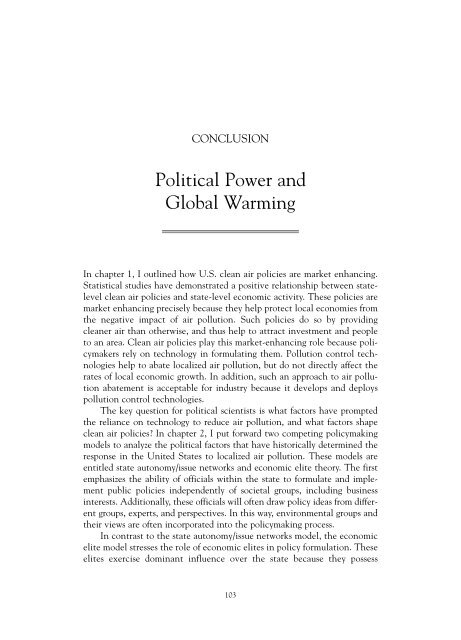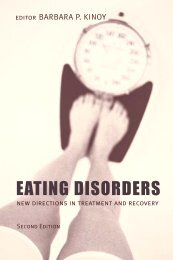CONCLUSIONPolitical Power andGlobal WarmingIn chapter 1, I outlined how U.S. clean air policies are market enhancing.Statistical studies have demonstrated a positive relationship between statelevelclean air policies and state-level economic activity. These policies aremarket enhancing precisely because they help protect local economies fromthe negative impact of air pollution. Such policies do so by providingcleaner air than otherwise, and thus help to attract investment and peopleto an area. Clean air policies play this market-enhancing role because policymakersrely on technology in formulating them. Pollution control technologieshelp to abate localized air pollution, but do not directly affect therates of local economic growth. In addition, such an approach to air pollutionabatement is acceptable for industry because it develops and deployspollution control technologies.The key question for political scientists is what factors have promptedthe reliance on technology to reduce air pollution, and what factors shapeclean air policies? In chapter 2, I put forward two competing policymakingmodels to analyze the political factors that have historically determined theresponse in the United States to localized air pollution. These models areentitled state autonomy/issue networks and economic elite theory. The firstemphasizes the ability of officials within the state to formulate and implementpublic policies independently of societal groups, including businessinterests. Additionally, these officials will often draw policy ideas from differentgroups, experts, and perspectives. In this way, environmental groups andtheir views are often incorporated into the policymaking process.In contrast to the state autonomy/issue networks model, the economicelite model stresses the role of economic elites in policy formulation. Theseelites exercise dominant influence over the state because they possess103
104THE POLITICS OF AIR POLLUTIONample wealth and income, which can be converted into a number of usefuland advantageous political tools: campaign finance, publicity, access, etc.Moreover, economic elites operate through policy-planning organizations,which supply them with information, analysis, and the means to build aconsensus on proposed policies among elites in general. Through such organizations,economic elites can determine and agree upon those policies thatare going to enhance their market positions and improve the overall operationof the economy.In turning to the empirical record, it becomes evident that the economicelite model offers deeper insight into the development of air pollution abatementpolicies than the state autonomy/issue networks one. As outlined inchapter 3, local businesspeople, and local chambers of commerce, have historicallyperceived air pollution as an economic negative. During the latenineteenth and early twentieth centuries, prominent business people inChicago took the political lead in the effort to abate air pollution. In seekingto do so, they operated through the Chicago Association of Commerce(CAC) and the Society for the Prevention of Smoke, which were comprisedof prominent business people—many of whom were heavily vested in thelocal economy. Both groups sought to use technology to improve the city’s airquality. Apart from local chambers of commerce and certain economic eliteledorganizations, only groups largely made up of and led by upper-classwomen undertook organized political action to address urban air pollution inthis era. Like the CAC and the Society for the Prevention of Smoke, theycentered their anti-smoke agenda on pollution control devices.Through the efforts of the CAC and the Society we can understand whylocally oriented economic elites’ concerns during the late nineteenth andearly twentieth centuries about air pollution did not result in cleaner urbanair during this period. Railroad firms were generally opposed to any effort toforce the electrification of their lines. Technological controls on coal-generatedsmoke from stationary sources were labor intensive and often ineffective.Hence, the implementation of technology to control air pollution ineither instance would have directly and negatively affected economicgrowth in Chicago and other localities. Without technology as a viablemeans to reduce air pollution, those U.S. industrial cities that were heavyusers of soft coal remained inundated with air pollution into the middle ofthe twentieth century. The response of public officials in cities with acute airpollution was to either ignore the problem or assuage the public throughrhetoric, unimplemented legislation, token enforcement actions, and/orineffective regulatory agencies.In the mid-twentieth century, oil and natural gas became economicallyviable fuels for the country as a whole. As a result, industrial cities thatheretofore burned large amounts of soft coal now experienced significantimprovements in air quality. During this period, however, a new threat to air
- Page 2:
The Politics of Air Pollution
- Page 7:
ContentsAcknowledgmentsviiONELocal
- Page 12 and 13:
LOCAL GROWTH COALITIONS 3tion, such
- Page 14 and 15:
LOCAL GROWTH COALITIONS 5how the U.
- Page 16 and 17:
LOCAL GROWTH COALITIONS 7growth (Ta
- Page 18 and 19:
LOCAL GROWTH COALITIONS 9In this pe
- Page 20 and 21:
LOCAL GROWTH COALITIONS 11ity tend
- Page 22 and 23:
LOCAL GROWTH COALITIONS 13In the ar
- Page 24 and 25:
LOCAL GROWTH COALITIONS 15who reduc
- Page 26 and 27:
LOCAL GROWTH COALITIONS 17cally mod
- Page 28 and 29:
TWOPolitical Economy and thePolicym
- Page 30 and 31:
THE POLICYMAKING PROCESS 21moves to
- Page 32 and 33:
THE POLICYMAKING PROCESS 23eral gov
- Page 34 and 35:
THE POLICYMAKING PROCESS 25groups
- Page 36 and 37:
THE POLICYMAKING PROCESS 27Given in
- Page 38 and 39:
THE POLICYMAKING PROCESS 29tions, t
- Page 40 and 41:
THE POLICYMAKING PROCESS 31the Conf
- Page 42:
THE POLICYMAKING PROCESS 33lars 199
- Page 45 and 46:
36THE POLITICS OF AIR POLLUTIONCOAL
- Page 47 and 48:
38THE POLITICS OF AIR POLLUTIONa go
- Page 49 and 50:
40THE POLITICS OF AIR POLLUTIONrush
- Page 51 and 52:
42THE POLITICS OF AIR POLLUTIONattr
- Page 53 and 54:
44THE POLITICS OF AIR POLLUTIONScot
- Page 55 and 56:
46THE POLITICS OF AIR POLLUTIONthe
- Page 57 and 58:
48THE POLITICS OF AIR POLLUTIONcrit
- Page 59 and 60:
50THE POLITICS OF AIR POLLUTIONwhen
- Page 61 and 62: 52THE POLITICS OF AIR POLLUTIONin t
- Page 63 and 64: 54THE POLITICS OF AIR POLLUTIONThe
- Page 65 and 66: 56THE POLITICS OF AIR POLLUTIONfirm
- Page 67 and 68: 58THE POLITICS OF AIR POLLUTIONinno
- Page 69 and 70: 60THE POLITICS OF AIR POLLUTIONThe
- Page 71 and 72: 62THE POLITICS OF AIR POLLUTIONFHA
- Page 73 and 74: 64THE POLITICS OF AIR POLLUTIONgone
- Page 75 and 76: 66THE POLITICS OF AIR POLLUTIONPres
- Page 78 and 79: FIVEThe Establishment ofAutomobile
- Page 80 and 81: AUTOMOBILE EMISSION STANDARDS 71ext
- Page 82 and 83: AUTOMOBILE EMISSION STANDARDS 73Ano
- Page 84 and 85: AUTOMOBILE EMISSION STANDARDS 75the
- Page 86 and 87: AUTOMOBILE EMISSION STANDARDS 77thr
- Page 88 and 89: AUTOMOBILE EMISSION STANDARDS 79was
- Page 90 and 91: AUTOMOBILE EMISSION STANDARDS 81exp
- Page 92 and 93: AUTOMOBILE EMISSION STANDARDS 83acc
- Page 94 and 95: AUTOMOBILE EMISSION STANDARDS 85Thu
- Page 96 and 97: AUTOMOBILE EMISSION STANDARDS 87A n
- Page 98 and 99: SIXDemocratic Ethics,Environmental
- Page 100 and 101: DEMOCRATIC ETHICS 91At the core of
- Page 102 and 103: DEMOCRATIC ETHICS 93senior attorney
- Page 104 and 105: DEMOCRATIC ETHICS 95ments mount cha
- Page 106 and 107: DEMOCRATIC ETHICS 97frameworks, as
- Page 108 and 109: DEMOCRATIC ETHICS 99mobiles and gas
- Page 110 and 111: DEMOCRATIC ETHICS 101the ecological
- Page 114 and 115: CONCLUSION 105quality became manife
- Page 116: CONCLUSION 107lation, the U.S. econ
- Page 119 and 120: 110THE POLITICS OF AIR POLLUTIONCHA
- Page 121 and 122: 112THE POLITICS OF AIR POLLUTION6.
- Page 123 and 124: 114THE POLITICS OF AIR POLLUTION4.
- Page 126 and 127: BibliographyAcher, Robin. 2001. “
- Page 128 and 129: BIBLIOGRAPHY 119Brienes, Marvin. 19
- Page 130 and 131: BIBLIOGRAPHY 121Cole, Luke W., and
- Page 132 and 133: BIBLIOGRAPHY 123——— . 2002. W
- Page 134 and 135: BIBLIOGRAPHY 125——— . 1975.
- Page 136 and 137: BIBLIOGRAPHY 127Hayward, Clarissa R
- Page 138 and 139: BIBLIOGRAPHY 129——— . 2001. E
- Page 140 and 141: BIBLIOGRAPHY 131——— . 1988.
- Page 142 and 143: BIBLIOGRAPHY 133Perez-Pena, Richard
- Page 144 and 145: BIBLIOGRAPHY 135Runte, Alfred. 1997
- Page 146 and 147: BIBLIOGRAPHY 137Tarr, Joel A. 1996.
- Page 148: BIBLIOGRAPHY 139Wiewel, Wim, and Jo
- Page 151 and 152: 142THE POLITICS OF AIR POLLUTIONChi
- Page 153: 144THE POLITICS OF AIR POLLUTIONTuc









